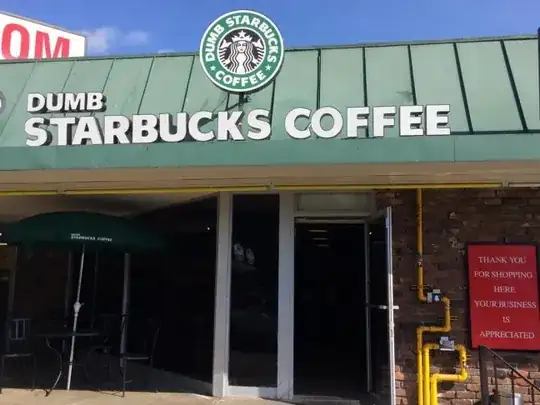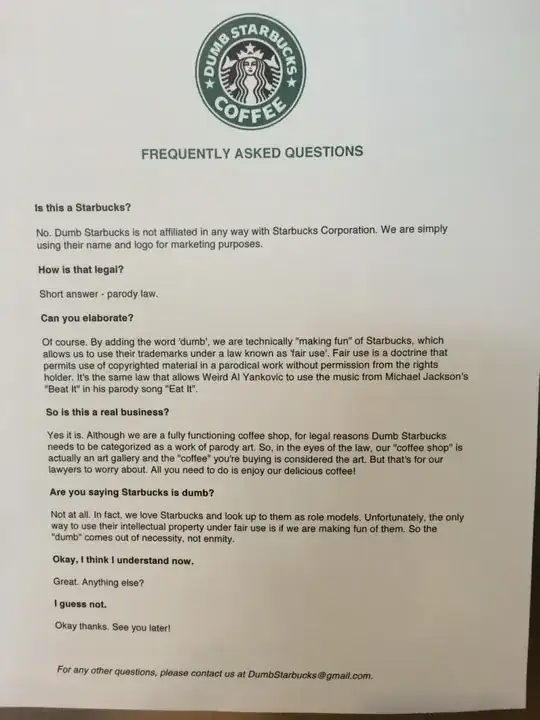This claim originated on 89.3 KPCC.


Is there really a "Dumb Starbucks" shop in existence? And, is what they're doing legal under "Parody Law"?
This claim originated on 89.3 KPCC.


Is there really a "Dumb Starbucks" shop in existence? And, is what they're doing legal under "Parody Law"?
http://www.hollywoodreporter.com/news/dumb-starbucks-shop-appears-las-678728
Dumb Starbucks Coffee, which parodies the design of a coffee giant chain store, appeared out of seemingly nowhere over the weekend as a pop-up store in a nondescript Hillhurst Ave. location.
It was the creation of Nathan Fielder and was closed by LA County Health inspectors. (ref)
Fair use of copyrighted works (see 17 U.S.C. § 107) is not the same as fair use of trademarks (see 15 U.S.C. § 1115(b)(4)).
They are different statutes, and the courts apply different tests.
Specifically, in asserting the affirmative defense of of 1115(b)(4) (the statutory fair use defense), the defendant would have to show that "a term is used descriptively, not as a mark, fairly, and in good faith". (KP Permanent Make-Up, Inc. v. Lasting Impression I, Inc. 543 US 111 (2004))
Parody has played a role apart from 1115(b)(4), though.
For example, Coca-Cola Co. v. Gemini Rising, Inc., 346 F. Supp. 1183 (E.D.N.Y. 1972), in which Coca-Cola successfully enjoined the defendant from printing, distributing and selling commercially a poster which consists of an exact blown-up reproduction of plaintiff's familiar "Coca-Cola" trademark and distinctive format except for the substitution of the script letters "ine" for "-Cola", so that the poster reads "Enjoy Cocaine."
An example of parody that was allowed by the courts is Jim Hensons's Muppet Treasure Island. It featured a character named "Spa'am". (see Hormel Foods Corp. v. Jim Henson Prods., 73 F.3d 497 (2d Cir. 1996)). This opinion makes it evident that parody is not treated as a special case in trademark law, but simply informs the multi-factor analysis of infringement.
Here's an in-depth discussion of trademark parody on Trademark Law Radio by Daniel Corbett.
Corbett gives a few bright line rules that somebody wishing to parody a mark should follow if they want to be more likely to successfully defend themselves in court. "Dumb Starbucks" breaks all of these rules. However, every case is analyzed case-by-case, so whether this is infringement will only be answered if this case goes to court.
Yes, a store was opened that when by the name of "Dumb Starbucks"; however, it was revealed to be a publicity stunt by Nathan Fielder for the show "Nathan for You"
Comedy Central’s Nathan Fielder revealed Monday that he’s behind Dumb Starbucks, the mystery coffee shop that made its debut in Los Feliz, Calif., over the weekend. Fielder, who’s currently filming the second season of his show Nathan for You, explained that the Los Feliz location of the store — which first garnered attention for its impressive re-creation of the Starbucks logo — will remain open through Friday.
In Fielder’s show, he helps business owners use funny strategies to try and succeed, though we’re doubting Starbucks is one of his clients. That being said, Fielder is not worried about using the trademarked Starbucks name, considering that what he’s doing is clearly a “parody art.”
Whether or not the store could be considered a business is debatable since they gave their product (i.e. the coffee) away for free and did not appear to be operating as other businesses, specifically,
It also does not have posted in public view a business license, nor a grade for a health inspection, like other coffee shops.
Shortly after a promotional video was released on YouTube the store was shut down for operating without a health permit,
The Los Angeles County Health Department shut down the Dumb Starbucks on Monday just as the man behind the faux coffee shop in Los Feliz revealed he was the host of a Comedy Central TV show.
The shop was closed for operating without a health permit, the department told The Times. A sign was posted on the front window of the store on Hillhurst Avenue on Monday evening, saying it was closed for violations.
With regards to the legality of the business in terms of their use of Starbucks logo and fair use, Starbucks says that their name cannot be used,
Starbucks has responded to the Los Angeles parody coffee shop/art thing Dumb Starbucks. A spokesperson tells Eater, "We are evaluating next steps and while we appreciate the humor, they cannot use our name, which is a protected trademark."
However, the legal standing of the store as a parody is being debated and it is currently unclear how a court case would be resolved,
Now that it’s clear Comedy Central was behind the "Dumb Starbucks" saga, UCLA Law Professor Neil Netanel says Starbucks would have a much tougher case should they choose to go after the outlet for trademark infringement.
"If the use of the Starbucks trademark, the logo and name relates to what the show is about or ties into the theme of the show in some way, then I think they’re [Comedy Central] on safer ground," Netanel told KPCC's Brian Watt.
But, he said, if Comedy Central is using the Starbucks name solely to draw attention to a show that has nothing to do with Starbucks, the coffee giant could make a credible trademark case against them. Is it worth it?
Actually determining if the use of Starbucks passes as trademark fair use is complicated since it would only be determined in a court case,
A registered trademark holder, by statute, has the right to sue other users of the same trademarked word or phrase for trademark infringement - but only when the other users' "use is likely to cause confusion, or to cause mistake, or to deceive."
Specifically, the trademark holder must show - according to the Court in K-P Permanent Make-Up Inc. - "that the [other user's] actual practice is likely to produce confusion in the minds of customers about the origin of the goods or services in question."
However, parody is a valid defense,
Finally, certain parodies of trademarks may be permissible if they are not too directly tied to commercial use. The basic idea here is that artistic and editorial parodies of trademarks serve a valuable critical function, and that this critical function is entitled to some degree of First Amendment protection. The courts have adopted different ways of incorporating such First Amendment interests into the analysis. For example, some courts have applied the general "likelihood of confusion" analysis, using the First Amendment as a factor in the analysis. Other courts have expressly balanced First Amendment considerations against the degree of likely confusion. Still other courts have held that the First Amendment effectively trumps trademark law, under certain circumstances. In general, however, the courts appear to be more sympathetic to the extent that parodies are less commercial, and less sympathetic to the extent that parodies involve commercial use of the mark.
All of this means that ultimately, without an actual court ruling, whether or not the store is legal from a trademark fair use standpoint is at best unresolved. Although, The Guardian did make the following summary which is worth keeping in mind,
The premise of Fielder’s Comedy Central show, “Nathan for You”, is that he gives terrible advice to small businesses. Whether the legal analysis in the Dumb Starbucks “FAQ” was correct or false became irrelevant. If the advice was correct (that fair use protected the “store” as a parody), then Fielder could operate as “Dumb Starbucks” without infringing on intellectual property. If the analysis was wrong, well, that’s just more of his terrible advice. Either way, Dumb Starbucks had to be fair use legally, because Fielder was making fun of Starbucks, which has a smart intellectual property protection team. “We’re an art gallery, and the coffee we’re selling is considered the art, and art galleries don’t need health permits,” he told Jimmy Kimmel on Tuesday night.”